新概念英语第一册课堂笔记-第11课
新概念英语第一册Lesson 11 笔记
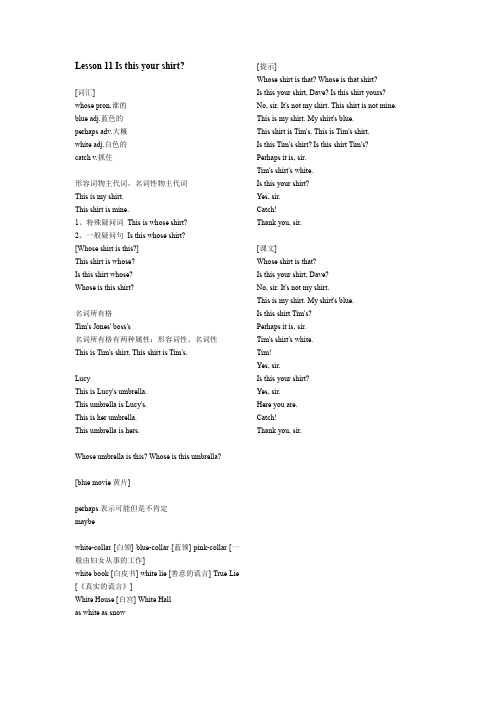
Lesson 11 Is this your shirt?[词汇]whose pron.谁的blue adj.蓝色的perhaps adv.大概white adj.白色的catch v.抓住形容词物主代词,名词性物主代词This is my shirt.This shirt is mine.1、特殊疑问词This is whose shirt?2、一般疑问句Is this whose shirt?[Whose shirt is this?]This shirt is whose?Is this shirt whose?Whose is this shirt?名词所有格Tim's Jones' boss's名词所有格有两种属性:形容词性、名词性This is Tim's shirt. This shirt is Tim's.LucyThis is Lucy's umbrella.This umbrella is Lucy's.This is her umbrella.This umbrella is hers.Whose umbrella is this? Whose is this umbrella? [blue movie黄片]perhaps表示可能但是不肯定maybewhite-collar [白领] blue-collar [蓝领] pink-collar [一般由妇女从事的工作]white book [白皮书] white lie [善意的谎言] True Lie [《真实的谎言》]White House [白宫] White Hallas white as snow [提示]Whose shirt is that? Whose is that shirt?Is this your shirt, Dave? Is this shirt yours? No, sir. It's not my shirt. This shirt is not mine. This is my shirt. My shirt's blue.This shirt is Tim's. This is Tim's shirt.Is this Tim's shirt? Is this shirt Tim's? Perhaps it is, sir.Tim's shirt's white.Is this your shirt?Yes, sir.Catch!Thank you, sir.[课文]Whose shirt is that?Is this your shirt, Dave?No, sir. It's not my shirt.This is my shirt. My shirt's blue.Is this shirt Tim's?Perhaps it is, sir.Tim's shirt's white.Tim!Yes, sir.Is this your shirt?Yes, sir.Here you are.Catch!Thank you, sir.。
2020最新新概念英语第一册Lesson111~116自学笔记精讲解析
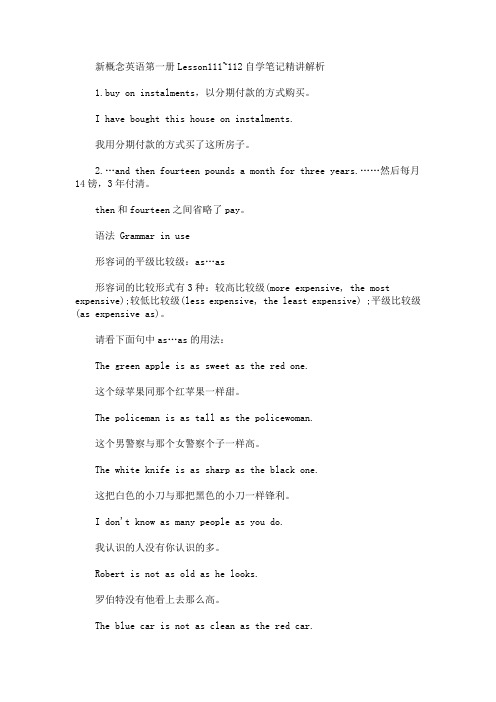
新概念英语第一册Lesson111~112自学笔记精讲解析1.buy on instalments,以分期付款的方式购买。
I have bought this house on instalments.我用分期付款的方式买了这所房子。
2.…and then fourteen pounds a month for three years.……然后每月14镑,3年付清。
then和fourteen之间省略了pay。
语法 Grammar in use形容词的平级比较级:as…as形容词的比较形式有3种:较高比较级(more expensive, the most expensive);较低比较级(less expensive, the least expensive) ;平级比较级(as expensive as)。
请看下面句中as…as的用法:The green apple is as sweet as the red one.这个绿苹果同那个红苹果一样甜。
The policeman is as tall as the policewoman.这个男警察与那个女警察个子一样高。
The white knife is as sharp as the black one.这把白色的小刀与那把黑色的小刀一样锋利。
I don't know as many people as you do.我认识的人没有你认识的多。
Robert is not as old as he looks.罗伯特没有他看上去那么高。
The blue car is not as clean as the red car.蓝车没有红车干净。
新概念英语第一册第111-112课重点词汇学习 Word study1.afford v.(1)买得起;付得起(钱):She can't afford a new coat.她买不起一件新大衣。
新概念一册11课重点语法 L11
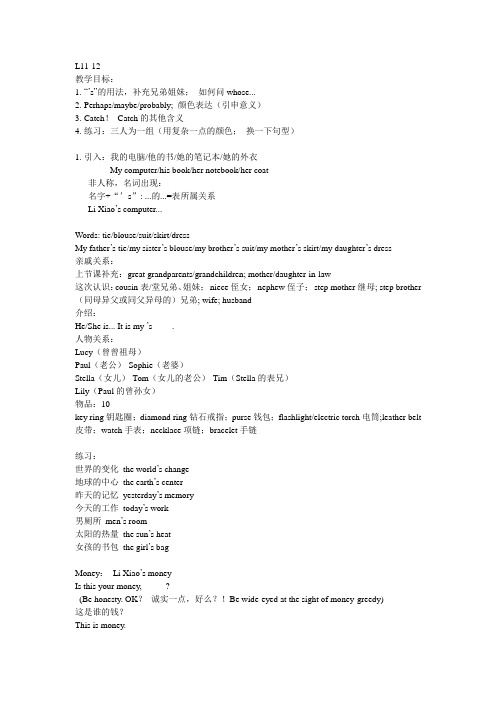
Grey zone灰色地带
A red red rose
A pink dress
Green forest
Brown lenses棕色美瞳Brown bear
A purple hat (violet紫罗兰)
Orange juice橘汁儿
A silver watch
A golden bracelet
Blue sky/ocean/sea
A yellow taxi
放歌:
Love Is Blue
Blue, blue my world is blue
Blue is my world now I ’m without you
Grey, grey my life is grey
/w/ /j/
wave, witness, while, work, when, white, swim, wise, wit, waste
yard, young, yellow, yesterday, yes, year
Wait a while等一下
/l/
little, floor, listen, police, line, love, blood, long
非人称,名词出现:
名字+“’s”: ...的...=表所属关系
Li Xiao’s computer...
Words: tie/blouse/suit/skirt/dress
My father’s tie/my sister’s blouse/my brother’s suit/my mother’s skirt/my daughter’s dress
新概念英语第一册Lesson111~116自学笔记精讲解析

【导语】新概念英语作为家喻户晓的经典之作,它有着全新的教学理念,有趣的课⽂内容及其全⾯的技能训练,为⼴⼤的英语学习者提供帮助!如果你也想学好英语,⼜怎能错过新概念英语?下⾯为您提供了相关内容,希望对您有所帮助!新概念英语第⼀册Lesson111~112⾃学笔记精讲解析 1.buy on instalments,以分期付款的⽅式购买。
I have bought this house on instalments. 我⽤分期付款的⽅式买了这所房⼦。
2.…and then fourteen pounds a month for three years.……然后每⽉14镑,3年付清。
then和fourteen之间省略了pay。
语法 Grammar in use 形容词的平级⽐较级:as…as 形容词的⽐较形式有3种:较⾼⽐较级(more expensive, the most expensive);较低⽐较级(less expensive, the least expensive) ;平级⽐较级 (as expensive as)。
请看下⾯句中as…as的⽤法: The green apple is as sweet as the red one. 这个绿苹果同那个红苹果⼀样甜。
The policeman is as tall as the policewoman. 这个男警察与那个⼥警察个⼦⼀样⾼。
The white knife is as sharp as the black one. 这把⽩⾊的⼩⼑与那把⿊⾊的⼩⼑⼀样锋利。
I don't know as many people as you do. 我认识的⼈没有你认识的多。
Robert is not as old as he looks. 罗伯特没有他看上去那么⾼。
The blue car is not as clean as the red car. 蓝车没有红车⼲净。
新概念111课笔记(汇编)

Lesson 111- 112--price1) n. 价格((用复数开式prices指物价)--The prices of vegetables are going up. 蔬菜价格正在上涨。
用法:1.表示price的“高,低”时,形容词用high, low; 表示东西的“贵,便宜时,用expensive, cheap.--The prices of watches are very low at that store.--Watches are very cheap at that store. 那家店的手表很更宜。
2.询问价钱时,price 与what 连用--What is the price of this camera?--How much is this camera? 这个照相机多少钱?--What does this camera cost?--cost v. 花费(金钱,时间)主语一般是物。
--This house cost me $90,000. 这座房子我花9万英镑。
--This job will cost us a great deal of time. 这个工作将花费我们大量的时间。
--spend v. 花(金钱,时间)主语一般是人--spend (money) on sth 在…方面花钱--I spent much money on the new car. 我在这辆车上花了很多钱。
--spend (time) in doing sth 花时间做某事--I spent a lot of time in reading. 我花很多时间读书小结:--How much does…cost? 问价钱--can’t afford付不起--not as….as…不及…怎么样--pay a deposit of …付….的定金--buy…on instalments分期付款的方式购买…语法:形容词与副词都有三个等级:原级,比较级和最高级。
新概念第一册:课文翻译及学习笔记Lesson11
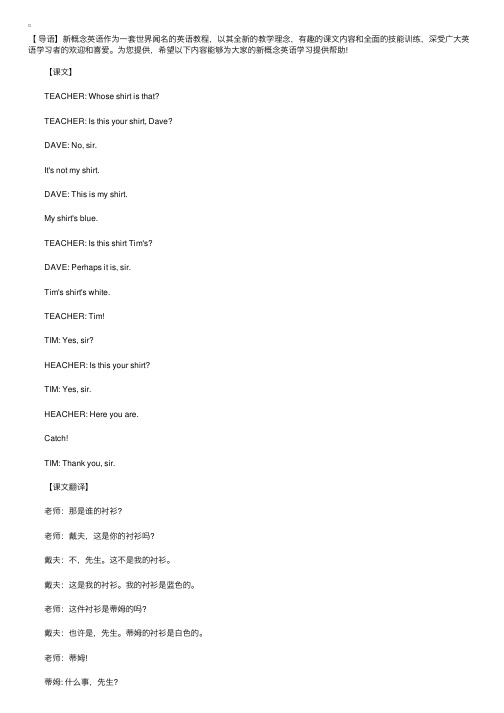
【导语】新概念英语作为⼀套世界闻名的英语教程,以其全新的教学理念,有趣的课⽂内容和全⾯的技能训练,深受⼴⼤英语学习者的欢迎和喜爱。
为您提供,希望以下内容能够为⼤家的新概念英语学习提供帮助! 【课⽂】 TEACHER: Whose shirt is that? TEACHER: Is this your shirt, Dave? DAVE: No, sir. It's not my shirt. DAVE: This is my shirt. My shirt's blue. TEACHER: Is this shirt Tim's? DAVE: Perhaps it is, sir. Tim's shirt's white. TEACHER: Tim! TIM: Yes, sir? HEACHER: Is this your shirt? TIM: Yes, sir. HEACHER: Here you are. Catch! TIM: Thank you, sir. 【课⽂翻译】 ⽼师:那是谁的衬衫? ⽼师:戴夫,这是你的衬衫吗? 戴夫:不,先⽣。
这不是我的衬衫。
戴夫:这是我的衬衫。
我的衬衫是蓝⾊的。
⽼师:这件衬衫是蒂姆的吗? 戴夫:也许是,先⽣。
蒂姆的衬衫是⽩⾊的。
⽼师:蒂姆! 蒂姆: 什么事,先⽣? ⽼师:这是你的衬衫吗? 蒂姆:是的,先⽣。
⽼师:给你。
接着! 蒂姆:谢谢您,先⽣。
【⽣词】 whose pron.谁的 blue adj. 蓝⾊的 perhaps adv. ⼤概 white adj. ⽩⾊的 catch v. 抓住 【知识点讲解】 1. ⼤家还记得在第七课⾥我们有简单提到不同的疑问词,⽤来问不同的事⼉。
⽐如who⽤来问⼈;when⽤来问时间等等。
今天我们再学习⼀个新的疑问词:whose。
这个单词⼀般⽤作定语,修饰名词。
翻译成中⽂就是“谁的”的意思。
新概念一册11课
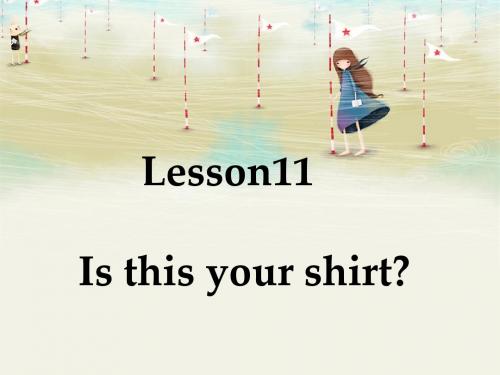
表示所属关系的代词叫物主代词。放在名词前起修饰限 定作用的物主代词叫形容词性物主代词。 形容词性物主代词包括: 单数形式:我的my;你的your; 他的his;她的her;它的its; 复数形式:我们的our;你们的your; 他/她/它们的their 用法注意: 1.只能用作定语,不能单独使用: my sister her handbag our classroom 2.物主代词的疑问形式是whose(谁的): Whose handbag is this? whose也可以单独使用: Whose is this handbag?
3.father n. 父亲 Like father, like son. 有其父必有其子。 Godfather 教父 grandfather 爷爷 father-in-law 公公,岳父
4.mother n.母亲 My mother is a teacher. 我妈妈是个老师。 grandmother 祖母 mother-in-law 婆婆,岳母 motherland 祖国 mother tongue 母语
Notes 1.Whose shirt is that? 那是谁的衬衫? 〖分析〗whose引导的特殊疑问句,回答时必须用形容 词性物主代词(my, his, your, her...)以及名词所有格 (Tom's, my father's...) 〖例句〗——Whose watch is this? ——It's my mother's. 2.Is this your shirt, Dave?戴夫,这是你的衬衫吗? 〖分析〗一般疑问句,助动词be提前。 〖例句〗——Is this your pen? ——No, it's not mine. It's hers.
新概念英语第1册第11-12课重点语法
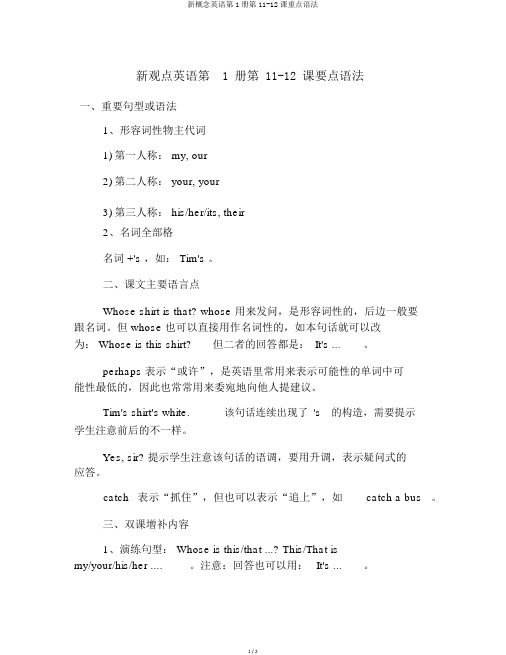
新观点英语第 1 册第 11-12 课要点语法
一、重要句型或语法
1、形容词性物主代词
1)第一人称: my, our
2)第二人称: your, your
3)第三人称: his/her/its, their
2、名词全部格
名词 +'s ,如: Tim's 。
二、课文主要语言点
Whose shirt is that? whose 用来发问,是形容词性的,后边一般要
跟名词。
但 whose 也可以直接用作名词性的,如本句话就可以改
为: Whose is this shirt?但二者的回答都是:It's ...。
perhaps 表示“或许”,是英语里常用来表示可能性的单词中可
能性最低的,因此也常常用来委宛地向他人提建议。
Tim's shirt's white.该句话连续出现了's的构造,需要提示
学生注意前后的不一样。
Yes, sir? 提示学生注意该句话的语调,要用升调,表示疑问式的
应答。
catch表示“抓住”,但也可以表示“追上”,如catch a bus。
三、双课增补内容
1、演练句型: Whose is this/that ...? This/That is
my/your/his/her ....。
注意:回答也可以用:It's ...。
2、识记单词 blouse/tie等。
3、梳理家庭成员名称: father/mother/brother/sister等。
4、数字: 22-31。
- 1、下载文档前请自行甄别文档内容的完整性,平台不提供额外的编辑、内容补充、找答案等附加服务。
- 2、"仅部分预览"的文档,不可在线预览部分如存在完整性等问题,可反馈申请退款(可完整预览的文档不适用该条件!)。
- 3、如文档侵犯您的权益,请联系客服反馈,我们会尽快为您处理(人工客服工作时间:9:00-18:30)。
新概念英语第一册课堂笔记-第11课Lesson 11 Is this your shirt?
whose pron. 谁的
blue adj. 蓝色的
perhaps adv. 大概
white adj. 白色的
catch v. 抓住
whose只跟形容词性物主代词,名词性物主代词相关系:This is my shirt.
This shirt is mine.
特殊疑问句的变换:
Step 1. 确定特殊疑问词
Step 2. 把句子变成一般疑问句 Is this whose shirt? Step 3. 把特殊疑问词提前 Whose shirt is this?
This shirt is whose?
Is this shirt whose?
Whose is this shirt?
另一个语法点:名词所有格
Tim’s Jones’ boss’s
一般情况直接加’s
人名字如果是s结尾的,直接加’
单词是s结尾的,加’s
名词所有格有两种属性:形容词性、名词性
This is Tim’s shirt. This shirt is Tim’s. Whose shirt is this? Whose is this shirt?
如果这个词后面跟了一个名词,那么就是形容词性所有格如果它是单独使用的,那么就是名词性所有格
This is Lucy’s umbrella.
This umbrella is Lucy’s.
This is her umbrella.
This umbrella is hers.
Whose umbrella is this? Whose is this umbrella?
blue movie 不健康的电影(黄色电影)
perhaps表示可能但不肯定,能够和maybe互换
white-collar blue-collar pink-collar一般由妇女从事的职业
white book政治或财政方面的书 white lie善意的谎言 True Lie
White House白宫 White Hall
as white as snow
★ Text
Whose shirt is that? Whose is that shirt?
Is this your shirt, Dave? Is this shirt yours?
No, sir.
It’s not my shirt. This shirt is not mine.
This is my shirt.
My shirt’s blue.
Is this shirt Tim’s?
Perhaps it is, sir.
Tim’s shirt’s white.
Tim!
Yes, sir.
Is this your shirt?
Yes, Sir.
Here you are.。
